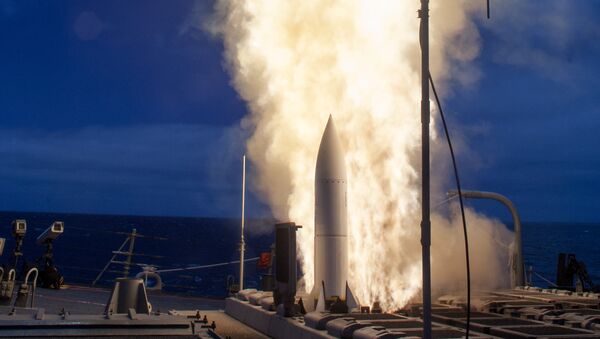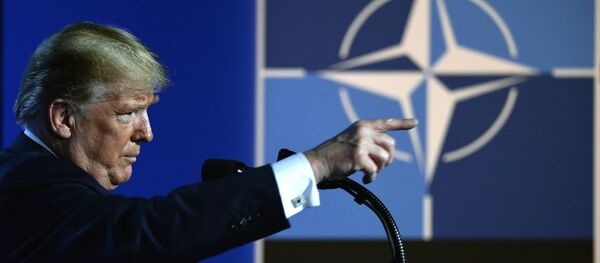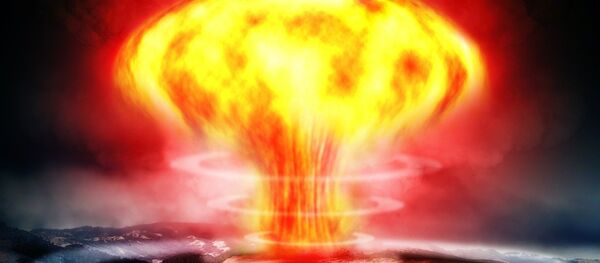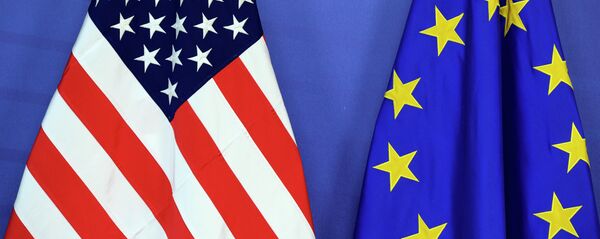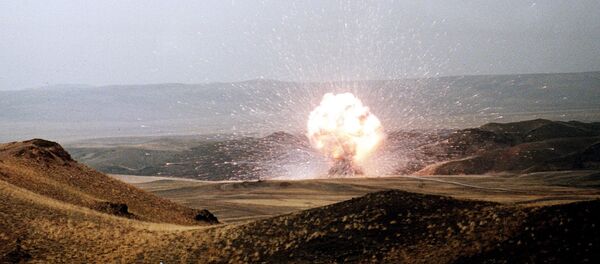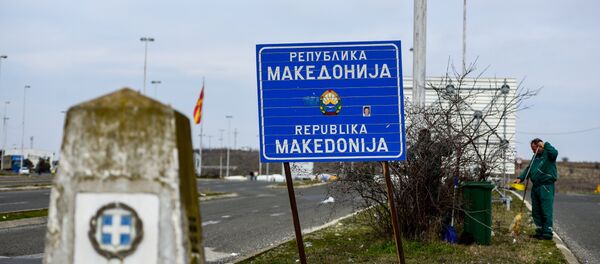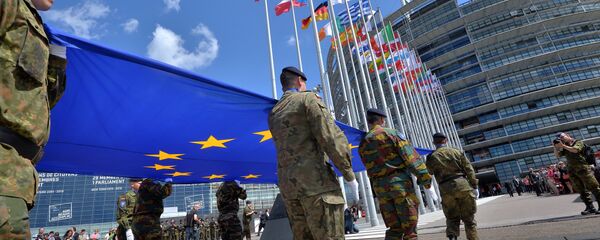He has spoken to Sputnik about the security situation, as well as why there can be no European security without Russia, how the European Union pushed through anti-Russian sanctions, and why there is a difference between the government’s and the ruling party’s positions.
Sputnik: How long have you been dealing with security and disarmament issues?
Back then, in Greece, under the government of Andreas Papandreou, we strongly supported the denuclearisation of the Balkans; we sought to have no nuclear weapons in the Balkans, no Balkan separation wall, which was similar to the Berlin Wall. It doesn't exist now, and recently we've broken down the wall in relations with the Former Yugoslav Republic of Macedonia.
I'm glad that in 2018 I was on Lake Prespa when the agreement was signed. This lake connects three countries — Greece, Albania, and Northern Macedonia; and it's symbolic that a peace agreement was signed there.
READ MORE: Official: NATO Doesn't Plan to Deploy New Ground-Based Nuclear Weapons in Europe
Sputnik: However, it doesn't solve all the problems.
Panos Trigazis: No agreement solves all problems. If agreements could automatically solve problems, the world would be better.
Sputnik: And now there will only be NATO countries around Greece.
Panos Trigazis: Syriza and the Greek left-wing parties have never supported the expansion of NATO. Much earlier, Bulgaria, Croatia, Albania, and Montenegro, which is considered very friendly to Russia, joined NATO.
But we were solving a national problem. We were solving it not for the sake of NATO, but for the sake of ourselves and our national interests. The Prespa agreement was by no means to facilitate the implementation of anti-Russian plans.
As with the Ukrainian problem, our party initially took a negative stance regarding anti-Russian sanctions because of Ukraine. We held rather tough negotiations, and Mr [Donald] Tusk [President of the European Council] told the Prime Minister: "Mr Tsipras, you are asking for the EU's help, but you support the enemies of the European Union", meaning Russia.
READ MORE: Deal With Russia Banning New Missiles in Europe in EU's 'Best Interest' — AfD
Sputnik: Is Russia the enemy of the European Union?
Panos Trigazis: Unfortunately, he says so. And these are former socialists from Poland.
Sputnik: We'll talk about Ukraine later. How do you assess the current situation in the world? Is it more dangerous than before?
Panos Trigazis: We live in a very unsafe world. Today's world is extremely unsafe; and this leads not only to the emergence of war and clash hotbeds but also to a global imbalance. Unfortunately, after the collapse of the Soviet Union, there has been a great imbalance in the world. After the Iraq war, US President George H.W. Bush proclaimed a so-called "new world order" which has brought many disasters to humanity. We had wars, again in Iraq and Afghanistan, and then there were some other problems because, unfortunately, the United States believed that the 21st century would be American; and they were saying openly that they would be "the rulers of the world".
International organisations like the UN were the victims of this sole superpower. After the Cold War, the organisation's role has declined, and it must be enhanced. As everyone said, with the end of the Cold War, we entered a period of stable peace, but global institutions, like the United Nations, should have been strengthened, and not undermined.
We should head towards a pan-European security system based on the OSCE that includes the former Soviet Republics; not only the West but all of Europe. Back then the United States was saying they couldn't leave Europe defenceless, and the Soviet Union said that they should participate in a meeting on security and cooperation between the US and Canada. They [the Soviet Union] didn't say "we'll drive you out of Europe", but called [for the US] to work for peace in Europe and for the withdrawal of nuclear weapons.
READ MORE: Putin: Russia to Take Steps if US Deploys Its Short, Medium Range Missiles in EU
Unfortunately, today, the great success achieved shortly before the end of the Cold War, in 1987, [which is] the withdrawal from Europe and the destruction of euro missiles and medium-range missiles [the INF], has been cancelled by the United States. Russia has also responded by declaring the agreement invalid.
We, fighters for peace, are not happy about this, because we wanted both countries to comply with the agreement.
Today, Mr Trump says that Russia is allegedly violating the agreement. Trump met with Kim Jong-un and discussed the denuclearisation of the Korean Peninsula. How come that he wants to destroy nuclear weapons on the Korean Peninsula and rejects an agreement that destroys nuclear weapons in Europe? Does he want to return to Europe as a "nuclear defender"? Woe unto us if Mr Trump and the United States return to Europe to bring us the so-called "nuclear umbrella". We don't want any nuclear umbrella.
Sputnik: A few days ago you said that you fully support Russia's position on the INF.
Panos Trigazis: Of course; we'd like Russia to remain in the agreement. But since the US has denounced the treaty and withdrawn from it, Russia cannot fulfil it. There should be reciprocity in such treaties. Both countries, America and Russia, must abide by the agreement.
During the Cold War, there were many agreements on the control of nuclear weapons, and on economic cooperation between America and Russia.
The two countries, the Soviet Union and the United States which were mortal enemies, could cooperate during the Cold War, and they can cooperate today for the benefit of world peace, and not just the peoples of Russia and America.
Panos Trigazis: Yes, it was good despite the Cold War. Back then there was the doctrine of Mutually Assured Destruction saying that the two great powers, the superpowers, could destroy each other. Fortunately, there was no mutual catastrophe; it would have been a global catastrophe.
Sputnik: Doesn't the current situation remind you of the Cuban Missile Crisis?
Panos Trigazis: I heard Russian President Vladimir Putin say there should be no repetition of the Cuban Missile Crisis or the Caribbean Crisis. We, the people of the world, don't want a repetition of such a crisis, as humanity was on the verge of disaster then.
Fortunately, the leaders of both Cuba [Fidel Castro] and the Soviet Union showed responsibility for humanity and made the necessary decisions. The United States, which pledged to remove nuclear weapons from Turkey, located close to Soviet borders, also pledged not to invade Cuba again. Fidel showed wisdom.
I think we could learn a lot from the Cold War period.
We, Syriza, say that we don't want a new Cold War in Europe, a new Cold War conducted under the pretext of the Ukrainian problem.
We don't want any sanctions not only against Russia but also against Iran, ostensibly due to the fact that Iran is ready to create nuclear weapons. This is hypocrisy, because, as you know, the only country in the Middle East that has nuclear weapons and a strong nuclear arsenal is Israel. The US government says nothing about that nuclear arsenal.
Iran complied with the nuclear agreement, and not only the United States, but also the EU countries, Germany, all the UN Security Council member states and, of course, Russia participated in it. Trump's actions were one-sided; the same as when he withdrew from the Paris Climate Accord.
Unfortunately, this shows irresponsibility for the future of humanity. It was followed by the reaction of the European Union, China and Russia. For me, this is an example when the EU can cooperate with Russia in the interests of peace and security throughout Europe.
Without Russia, there can be no European security. The EU must find ways to cooperate with Russia. This is my personal position, which I often state in my articles.
READ MORE: EU Made Decision on Russia Sanctions Over Kerch Strait Incident — Austrian FM
Europe must build new relations with Russia. The same as it was with the EEC, the European Economic Community, and the Council for Mutual Economic Assistance. It was a big step.
There is great interdependence between the EU and Russia. Interdependence means cooperation, forced cooperation, let's say, on energy issues. Can European energy policy exist without Russia? No, it cannot.
Germany, Europe's strongest economy, has very strong ties with Russia.
Sputnik: Recently my Greek friend visited Russia and was surprised that there are a lot of goods from Germany and France in stores — from countries that support anti-Russian sanctions.
Panos Trigazis: Yes, unfortunately, they support them.
Panos Trigazis: No, I don't think this is right. Maybe at some point, there was some NATO aircraft, but in Greece, we don't have nuclear weapons. It was withdrawn under Prime Minister Andreas Papandreou, and then the Cold War ended.
Greece had American and NATO nuclear weapons after 1957; it's a fact. We had them after 1957.
Sputnik: But Greece also denied having them then.
Panos Trigazis: The existence of arsenals has always been a secret. But today we don't have it, that's for sure; there is nothing. After the Cold War NATO aircraft carrying nuclear weapons were also arriving in Araxos, and they were in constant readiness. That was within the NATO strategy of retaining nuclear weapons in Europe after the Cold War. As you know, there are nuclear weapons in Belgium, Germany, and Turkey at the Incirlik Base.
Here, in Greece, there are no nuclear weapons; at least not on the bases.
If there was a plane that was part of NATO exercises, I don't know about that. But there are no American or NATO nuclear weapons bases in Greece.
READ MORE: Venezuelan Opposition MP Claims Government Plane Flew to Greece to Sell Gold
Sputnik: Fred Frederickson, the head of the NATO Nuclear Policy Directorate, was in Greece a few months ago.
Panos Trigazis: I don't rule this out. The doctrine of so-called nuclear deterrence still exists within the framework of NATO. We, the leftists, didn't believe in nuclear deterrence even in the Cold War era. What does nuclear deterrence mean? [It means that] you use nuclear weapons. We don't want to even think about the idea that someone will use nuclear weapons. We don't consider nuclear weapons a means of defence; we consider them a means of destruction. Therefore, we support the complete destruction and prohibition of nuclear weapons. This is our position.
And we were glad when in 2010 President Dmitry Medvedev signed an agreement with Barack Obama — a rather rare agreement after the Cold War — on reducing strategic nuclear weapons. We welcomed that agreement, and we hope that it will not be cancelled by Mr Trump. Unfortunately, he is doing everything to denounce everything Obama did. Obama signed an agreement with Iran — "we don't want it, we'll cancel it"; he held meetings to restore relations with Cuba — "we don't respect him; we'll continue the embargo". This is the situation today, and we are concerned.
Sputnik: And now Trump has been nominated for the Nobel Peace Prize.
Panos Trigazis: I hope that such an initiative won't be fruitful. I think the 2019 Nobel Peace Prize will go to Alexis Tsipras and Zoran Zayev, two Balkans, but not an American and an Asian. We'll see.
Sputnik: During the Syriza government, we've seen new American bases in Greece.
Panos Trigazis: There are no bases.
Panos Trigazis: The base in Suda is under a Cold War-era agreement. There are no new bases. When former Defence Minister Panos Kammenos went to America, he, without asking Prime Minister Alexis Tsipras and Foreign Minister Nikos Kotzias, said that we would give the bases to the Americans. That led to great unrest in Greece. Without notifying the prime minister and the foreign minister, he said: "I will give the bases to the Americans and sign a quadrilateral anti-Russian agreement in the Balkans". This shouldn't be said. Only the hawks of war say this, not peace-loving people.
Greece has no use for American bases. I wish that at some point we could get rid of the Suda base.
Sputnik: But now the US is using bases in Larissa, Alexandroupoli and Kalamata. If I am not mistaken, there are five more bases.
Panos Trigazis: I often say this to my friends in the left movement — we are not for the Cold War, we are not for military alliances. We don't want a single military alliance in the world. If Russia creates some kind of military coalition, we will be against it. We don't want any military blocs, and therefore we want to liquidate NATO; we constantly say this. In the European Left Party, we support the dissolution of NATO.
But blaming NATO is not enough. In order to eliminate NATO, we need to ensure new global balances; and we want the European Union to become the axis of peace for the whole world. Europe must get rid of Euro-Atlanticism. Europe should get autonomy and independence from the United States, and hence the proposal, which, I hope, Russia will support — the pan-European security system with the participation of Russia. That way we could get rid of the hegemony of the United States.
This is the key. Instead of just blaming, and this is what the Communist Party of Greece is doing, we are looking for a way to achieve new balances both in Europe and in the world so that the Americans aren't on our back.
New balances mean cooperation, first of all, on security issues between the European Union and Russia; and not only for Europe but for the whole world.
READ MORE: Greece's ELIAMEP Foundation Denies Links to UK Integrity Initiative Project
Sputnik: Do you think that soon it will be necessary to create a new movement for the denuclearisation of the Peloponnese?
Panos Trigazis: I don't think that there is a danger that nuclear weapons will appear in Peloponnese. We won't accept it, because we are against nuclear weapons. We are against nuclear power plants, like the one that Turkey is building in Akkuyu in cooperation with Russia. We don't want any nuclear weapons in our region, nor nuclear power plants. Greece won't build any nuclear power plants on its territory.
However, we don't deny Russia's right to have good relations with a neighbouring country. We don't say that Russia shouldn't have good relations with the Turks, because they threaten Greece. They are neighbours, they have common interests; the same as we have common interests with Turkey. We cooperate with Turkey on economic issues. This is the key to peace.
In the middle of the year, a Greece-Turkey Economic Forum will take place in Thessaloniki because we want to develop relations. There are many other topics to be covered as well. Who can we cooperate with to protect the environment in the Aegean Sea? If we want to have life in the Aegean Sea, we have to find ways to cooperate with Turkey. Fish in the Aegean Sea don't have Greek or Turkish flags.
Sputnik: It seems that Syriza has changed its position regarding the situation in Venezuela. Initially, there were statements that Syriza had condemned the coup attempt in Venezuela; and then [there were statements that] saying there should be a vote.
Panos Trigazis: It's still condemning it.
It should be clarified first of all that Greece is not the Soviet Union; the state is not identified with the party. The government, since it is in the European Union, can take any position. The party may have its own, different position.
The party Syriza has never said that we oppose the Maduro government. No one can proclaim themselves president by speaking at a rally. This is the decline of democracy. It would be like if the Chairman of the Greek parliament, Nikos Vucis, comes out at some meeting and says that "I am the Prime Minister, not Tsipras".
We've seen democratic changes in Latin America — in Venezuela, Brazil, Argentina, and other countries. We believe that Europe should follow the example of Latin America and move against neoliberalism.
And therefore we warmly supported Hugo Chavez's Bolivarian revolution. After the death of Chavez, things didn't go well in Venezuela. Maduro didn't do as well as Chavez; there were many problems in the country.
Economic problems are the key to stability and democracy in the country. And now, when we left the memorandums with creditors [assistance programmes in exchange for reforms and austerity policy], we say that Greece can become a normal country and a normal democracy.
And let's not forget that Alexis Tsipras was the only European leader who went to Fidel Castro's funeral.
READ MORE: Germany, Russia Defend Nord Stream 2 As France Joins EU Anti-Pipeline Move
Sputnik: There are reports that Venezuela is helping the Syriza Party and financing it.
Panos Trigazis: No, nobody helped us. We've achieved everything in Greece ourselves with the support of the Greek people. If we hadn't signed the third memorandum with creditors, we would have lost our place in Europe to the delight of the country's enemies. We didn't want to be out of Europe when Turkey is knocking on the European door. That would be a disaster for Greece.
Sputnik: Let's speak about another coup d'état — in Ukraine. Tsipras condemns fascism, Nazism, but supports the current regime in Ukraine. Is that a manifestation of double standards?
Panos Trigazis: Let's not confuse things. One thing is a parliamentary democracy, and another is fascism.
Some say there is no democracy in Russia. I wonder why they think there is no democracy. Are there no free parties? The Communist Party is the second in Russia. Are there no elections? There are. Is there respect for the Russian Constitution? Why do you condemn Russia and say that there is no democracy there?
In Ukraine, there was a rebellion on Maidan Square. There were not only fascists; there were people who wanted to go to Europe.
Sputnik: Sure, but the Nazis came to power.
Panos Trigazis: The rightists came to power, not the fascists. There are ultra-right in the government of Hungary; Orban is ultra-right, he is xenophobic, but not a fascist.
READ MORE: American White Nationalists Receive Training from Ukrainian Neo-Nazis
Sputnik: Orban doesn't bomb his own people.
Panos Trigazis: Do you mean the war in Eastern Ukraine? You're right.
We support the Minsk process, in which Russia, Ukraine, France, and Germany participate. Thanks to Hollande and Merkel, we, Europe, didn't allow the Americans to enter the Minsk process. We'd like to participate in the process, and in resolving the Ukrainian crisis via the OSCE, and this is now happening.
Sputnik: The Communist Party is banned in Ukraine.
Panos Trigazis: We consider that unacceptable. We have condemned it. This shows that there is no democracy. Banning the Communist Party is a sign that there is no democracy. As in some other former socialist countries, unfortunately, the communist parties and the very word "communism" have been prohibited.
Sputnik: When will there be elections in Greece? Will they be early?
Panos Trigazis: We've experienced eight tragic years of memorandums [with creditors]. We've been fighting to stop custody by the troika [the creditors]. Now Greece has many opportunities to enter a trajectory for economic recovery and development. There are many countries where growth rates are high, but there are millions of poor and unemployed.
We want fair development. [We want] development for the people, for the socially vulnerable; not to make the rich richer and the poor poorer. Now that the situation in Greece has stabilised, the country can hold elections, as the Constitution provides, at the end of a four-year term of office. The deadline is October 2019. The government has to vote in parliament for various measures in support of the people. We won't give it back to opposition leader Kyriakos Mitsotakis.
Sputnik: Do you mean that the elections will take place in October?
Panos Trigazis: Yes, they will be in October.
